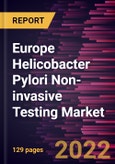Diagnosis of H. pylori infection is performed by invasive (endoscopy and endoscopic biopsy for histopathology, culture, and rapid urease test) and non-invasive (urea breath tests, stool antigen test, and serological tests) methods. The diagnostic decisions are based on the prevalence of H. pylori infection and the number of incidences of age-related gastric cancer. For instance, non-invasive techniques are preferred mostly when the incidence of gastric cancer is low. However, endoscopy is recommended for patients who have a high probability of being diagnosed with gastric cancer, such as patients above 60 years of age or younger patients in a few European countries, or patients with a family history of gastric cancer, or countries with a high incidence of gastric cancer. Further, precise accuracy is obtained by using multiple diagnostic tests. Although these tests have high accuracy, endoscopy-based diagnostic methods are not recommended for screening purposes, mainly due to their invasiveness, high cost, and unavailability. However, in a few European countries, endoscopy is recommended for patients over the age of 45 years who have a high chance of developing gastric cancer. Thus, governments of various European countries are boosting awareness of the diagnosis of H. pylori, which is expected to fuel the market growth.
Further, in 2020, RedHill Biopharma launched a nationwide H. pylori disease state educational field led by its sales team. The launch is intended to provide greater awareness to healthcare professionals regarding the risk of H. pylori infection and the growing resistance of H. pylori to standard care of antibiotics, which leads to 25-40% failure of current therapies.
Market Overview
As per the Elsevier B.V. report, H. pylori infects ~25% of the German population and causes gastritis that becomes more complicated with peptic ulcer disease, gastric adenocarcinoma, or mucosa-associated lymphoid tissue (MALT) lymphoma annually. According to the National Institute of Health (NIH) report, H. pylori infection causes chronic inflammation that significantly increases the risk of developing duodenal and gastric ulcer disease and gastric cancer. Additionally, H. pylori infection is the strongest known risk factor for gastric cancer and is the second-leading cause of cancer-related deaths globally. As per the same report, ~15,500 people annually have gastric cancer, with a decreasing number of incidences and a 5-year survival rate of 30-35%. Moreover, Germany has no gastric cancer prevention programs, resulting in the disease being diagnosed frequently in locally advanced stages. Such aforementioned factors are responsible for the growth of the Helicobacter pylori (H. pylori) non-invasive testing market.Europe Helicobacter Pylori (H. pylori) Non-invasive Testing Market Segmentation
The Europe helicobacter pylori (H. pylori) non-invasive testing market is segmented on test type, test method, end user, and country. -Based on test type, the Europe Helicobacter pylori (H. pylori) non-invasive testing market is segmented into serology, stool antigen, and urea breathe. In 2022, the urea breath segment is expected to hold the largest share of the market.- Based on test method, the Europe Helicobacter pylori (H. pylori) non-invasive testing market is bifurcated into laboratory based and point of care. The laboratory based segment is expected to hold a larger share of the market in 2022.
- Based on end user, the Europe Helicobacter pylori (H. pylori) non-invasive testing market is segmented into hospitals, clinics, and diagnostic laboratories. The diagnostic laboratories segment is expected to hold the largest share of the market in 2022.
- Based on country, the market is segmented into France, Germany, Italy, the UK, Spain, and the Rest of Europe. Further, Germany dominated the market in 2022. Abbott Laboratories; Bio-Rad Laboratories Inc.; CerTest Biotec; Coris BioConcept; DiaSorin S.p.A.; Meridian Bioscience Inc.; QuidelOrtho Corporation; Sekisui Diagnostics; Shenzhen Zhonghe Headway Bio-Sci & Tech Co., Ltd; and Thermo Fisher Scientific Inc. are the leading companies operating in the helicobacter pylori (H. pylori) non-invasive testing market in Europe.
Table of Contents
Companies Mentioned
- Abbott Laboratories
- Bio-Rad Laboratories Inc.
- Certest Biotec; Coris Bioconcept
- Coris Bioconcept
- Diasorin S.P.A.
- Meridian Bioscience Inc.
- Quidelortho Corporation
- Sekisui Diagnostics
- Shenzhen Zhonghe Headway Bio-Sci & Tech Co., Ltd
- Thermo Fisher Scientific Inc.
Table Information
| Report Attribute | Details |
|---|---|
| No. of Pages | 129 |
| Published | November 2022 |
| Forecast Period | 2022 - 2028 |
| Estimated Market Value ( $ | $ 198.4 Million |
| Forecasted Market Value ( $ | $ 244.01 Million |
| Compound Annual Growth Rate | 3.5% |
| Regions Covered | Europe |
| No. of Companies Mentioned | 10 |








